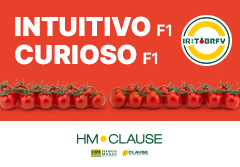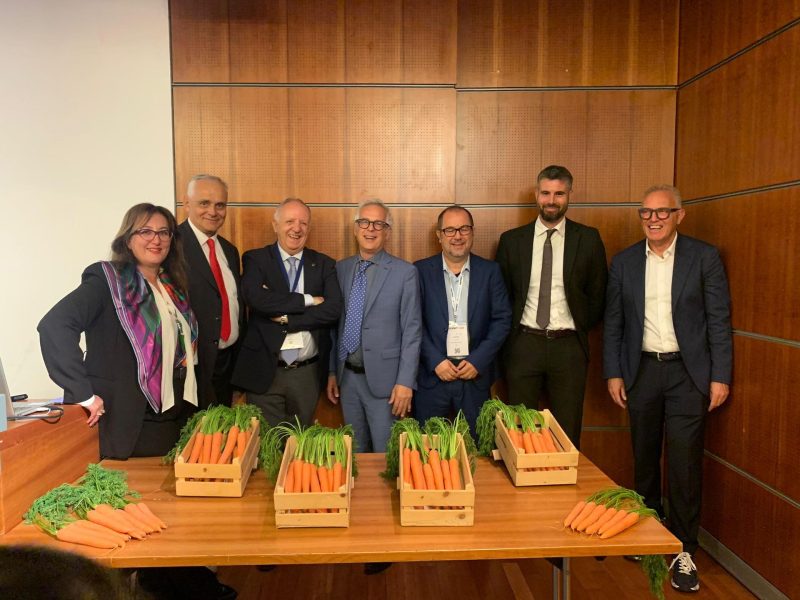Carrot Day was a great success. The technical and scientific conference dedicated to the carrot supply chain was organised by Cora Seeds – the Italian seed company now among the global leaders in carrot breeding. Founded and led by Maurizio Bacchi, Cora Seeds specialises in the development of high-performance vegetable varieties. Following the acquisition of the KWS carrot breeding programme in 2023, carrots have become one of the company’s key drivers for global growth, placing Cora Seeds among the top 5–6 players worldwide in carrot breeding.
The event, held in Rimini, Italy during Macfrut 2025, brought together more than 70 participants, including Italian experts and international colleagues from Spain, Germany, the Netherlands and Northern Europe. The focus was on genetics, regional development, agronomic challenges and consumption trends for a crop that is increasingly strategic for the future of horticulture.
“Cora Seeds has always been committed to promoting innovation and sustainable development in horticulture,” stated Maurizio Bacchi, CEO of the company. “Carrot Day was an excellent opportunity to share knowledge and experiences, as well as gain insights into the latest research frontiers.”
ISMEA data: a robust and expanding market
Mario Schiano Lo Moriello, analyst at ISMEA, provided a detailed analysis of the carrot sector at both an Italian and European level. The data paints a picture of a growing sector, characterised by competitiveness and strong potential to meet future challenges, thanks to a healthy balance between production, consumption and exports.
Europe records an average annual production of 4.7 million tonnes (2016–2024), with consumption nearly matching it at 4.68 million tonnes – indicating a largely self-sufficient production system. The leading producing and consuming countries are Germany, Poland and France.
For Italy, the numbers show a strong competitive position: 11,000 hectares under cultivation (1,000 of which are organic), primarily in Sicily (27%), Lazio (19%), Abruzzo (16%) and Emilia-Romagna (15%). The country produces over 500 million kilograms annually, maintains a positive trade balance of €90 million, and has a strong export orientation, with a 13% average annual growth in exports over the past decade. Italian carrots boast a national average per capita consumption of 6kg and 20% of harvests destined for export, with the largest importers being Germany, France and Poland.
Schiano highlighted Italy’s global ranking as the fifth largest carrot exporter, accounting for 6% of global exports and registering a 13% average growth rate over the past ten years. The key challenges for the sector remain adding value to production, responding to increasingly higher quality standards set by large-scale retailers, adapting to more stringent EU phytosanitary regulations and boosting competitiveness on the international stage.
Precision genetics: Cora Seed’s global strategy
The event’s keynote presentation was made by Jan De Visser, carrot breeder at Cora Seeds, who set out the technical challenges and opportunities associated with the genetic development of carrots. De Visser focused on the new breeding programme acquired from KWS Vegetables in 2023 – a relatively young project, launched in 2010, which Cora Seeds has integrated and revitalised to develop high-performing hybrids.
He further outlined Cora Seeds’ approach to developing these new varieties, which are designed for genetic resistance, adaptability to climate change, and compatibility with zero-residue production systems.
“We are developing genetic solutions tailored for zero-residue farming and suitable for fresh-cut production,” explained De Visser. “This allows us to respond to the challenges posed by increasingly strict EU regulations and climate change.”
“There are many challenges,” he concluded, “but these challenges are precisely what shape the strength and direction of our research.”
Large-scale retail and changing consumer habits: the importance of product positioning
Matteo Mazzoni, Sales Director at the Mazzoni Group, emphasised the evolution of the product within high-volume retail channels and along the entire production chain.
“We are witnessing a phase of transformation in the carrot supply chain, as well as in agriculture more broadly, due to increasingly evident climate change and shifting consumption patterns. Our markets demand ever higher standards of quality and service; to meet these needs, we must invest in techniques, technologies and varieties.”
RELATED NEWS: Macfrut confirms its growth path: over 61,000 visitors
According to Mazzoni, carrots can now be considered a “dynamic crop”, capable of generating value throughout the supply chain – especially when supported by advanced genetics and transparent, integrated production systems.
Sustainable agriculture and dedicated growing areas: creating the right balance
The technical programme concluded with insights provided by Massimo Pavan (Consorzio Carota Novella IGP) and Rodolfo Occhipinti (SATA), who addressed the increasingly complex agronomic challenges associated with carrot cultivation.
The reduced availability of crop protection products, combined with rising pressure from pests and pathogens and growing demands for zero-residue cultivation, are putting agricultural businesses under significant strain.
Both experts emphasised that a coordinated approach is essential – one that integrates genetics, cultivation techniques and environmental sustainability to ensure quality and competitiveness.



















